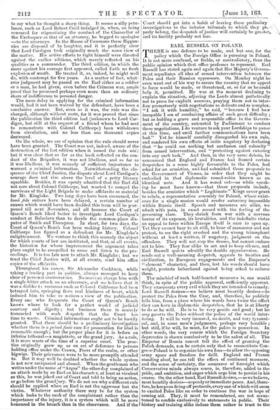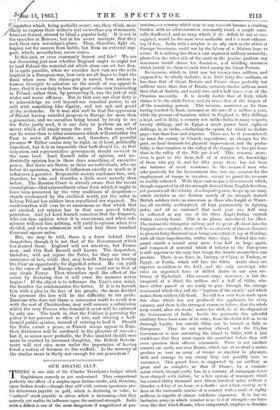EARL RUSSELL ON POLAND.
THERE is one defence to be made, and but one, for the policy which the Foreign Office is pursuing in Poland. It is not more confused, or feeble, or contradictory, than the public opinion which that office professes to represent. Earl Russell has stated again and again that Her Majesty's Govern- ment repudiates all idea of armed intervention between the Poles and their Russian oppressors. On Monday night he even went out of his way to assure the country that no appeal to force would be made, or threatened, or, so far as he could help it, permitted. He was at the moment declining to explain the situation, adjuring the Lords almost pathetically not to press for explicit answers, praying them not to inter- fere prematurely with negotiations so delicate and so complex_ "I ask it with humility," he said, " because I feel how incapable I am of conducting affairs of such great difficulty ; but as holding a grave and responsible office in the Govern- ment of the country, entrusted by Parliamant to conduct these negotiations, I do venture to ask your Lordships to pause at this time, and until further communications have been had." Yet he himself carefully disregarded his own rule, and rendered his own efforts ab initio nugatory by declaring that " he could see nothing but confusion and calamity" from armed intervention, and " protesting against entering into any such task." And then, in the very same debate, lie: announced that England and France had framed certain despatches in a sense highly favourable to the Poles, had asked for an armistice, and had submitted those proposals to. the Government of Vienna, in order that they might be embodied in that diplomatic round-robin known as an identical note. And it has oozed out—as while speak- ing lie must have known—that these proposals include,. besides the armistice which " Legitimate" Kings never grant to rebels, a representative assembly for Poland, whose exist- ence for a single session would render autocracy impossible. withinRussia itself. Speech and measures are alike, we admit with pain, in exact accord with the feeling of the. governing class. They shrink from war with a nervous- horror of its expense, its brutalities, and the indefinite vistas an appeal to force within Europe itself is sure to open up.. Yet they cannot bear to sit still, to hear of massacres and not protest, to see the right crushed and the Wrong triumphant without at least a written, if nugatory, judgment on the offenders. They will not stop the drama, but cannot endure not to hiss. They fear alike to act and to keep silence, and Earl Russell quiets adroitly the double apprehension. lie sends out a well-meaning despatch, appeals to treaties and civilization, to European engagements and the Emperor's " element " character, and then, lest his words should have- weight, protests beforehand against being asked to enforce them.
The mischief of such half-hearted measures is, one would. think, in spite of the public approval, sufficiently apparent. They exasperate every evil which they are intended to remedy. Lord Russell desires—we believe most heartily desires—te protect. the Poles from the Czar, and, therefore, lie publicly tells him, from a place where his words have twice the effect they can have in diplomatic despatches, that he is at liberty to do as he will. lie is to be very gentle and good ; but he may garotte the Poles without the police of the world inter- fering. It will be very immoral, no doubt, and very tyranni- cal, and, in some men's judgments, perhaps very horrible ; but still, if he will, he must, for the police is powerless. In other words, the very course which the Foreign. Secretary deprecates is shown conclusively to be the safest of all. The Emperor of Russia cannot tell the effect of granting the Polish demands, can be certain only that to reconstitute Con- gress-Poland is to organize his own foes—to allow the opposing army space and freedom for drill. England and France standing aloof, he can tell the effect of continued massacre, and the sense of certainty, the assurance of foresight which Conservative minds always crave, is, therefore, added to the pride, and ambition, and anger which urge him to persist in his course. On the other hand, Earl Russell desires,—as webelieve, most heartily desires—aspeedy or immediate peace. And , there- fore, he keepson firing off protocols, everyone of which will seem. to excited Poles like an order to continue the war in hope of coming aid. They, it must be remembered, are not accus-, to,med to confide exclusively to statements in public. Their history and training alike induce them rather to trust to the '''Spatches which, being partially secret, are, they think, more /lady to express their writer's real views than any statements, however formal, uttered to blind a popular body. It is not in his speeches at Moscow, but in his secret rescripts that they seek their own sovereign's plans. They, therefore, fight on, hoping not for success from battle, but from an external sup- port, which, nevertheless, never comes. Is this just, or even commonly honest and fair? We are not discussing just now whether England ought or ought not to lend Poland the material aid which alone can set her free. It is quite possible, when we consider how vast are the evils implied in a European war, how vain arc all hopes to limit the flood when once the sluice-gate is raised, how useless is human foresight to calculate on the result of any appeal to force, that it is our duty to bear the great crime now transacting in Poland, rather than, by preventing it, run the risk of still wider and worse offences. But in that case our clear duty is to acknowledge an evil beyond our remedial power, to sit still with something like dignity, and not spit and growl at the avalanche. Or it may also well be that the oppression of Poland having retarded progress in Europe for more than a generation, and we ourselves being bound by treaty to see the Poles justly used, it is our duty to perform an act of mercy which will amply repay the cost. In that case, what can be worse than to utter assurances which will embolden the Czar to resist all diplomatic, and, therefore, all peaceful pressure ?Ilt Either course may be right, or at least, politically expedient, but it is as impossible that both should be, as that despotism and representative government should co-exist in the same land. Lord Russell talks of opinion, and un- doubtedly opinion has in these days something of executive power. But there are States, as there are individuals, who are below its operation, whom it influences exactly as much as it influences a garotter. Respectable society condemns him, and, therefore, he robs and throttles a little more secretly than before. The Russian Court is already aware that the recent conscription—that extraordinary crime from which it ought to have been preserved by the very traditions of despotism— stands condemned by the civilized world, yet the order to kidnap Poland has neither been repudiated nor repaired. No condemnation will ever be so unanimous as that which that act excited, yet opinion has in that case proved totally powerless. And yet Lord Russell conceives that the Emperor, who can face opinion when it is unanimous, and when sub- mission will cost him nothing, will yield to opinion when it is divided, and when submission will cost him three hundred thousand square miles. But, we may be told, there is a force behind these despatches, though it is not that of the Government which has framed them. England will not interfere, but France may, and this Earl Russell well knows. The despatches, therefore, will not injure the Poles, for they are sure of assistance at last, while they may benefit Europe by leaving the Czar an opportunity for dignified retreat. He can yield to the voice of united. Europe when he could not to that of any single Power. Then wherefore spoil the effect of the -union by declaring that it will cease the moment action begins ? If the object is to influence the Czar's own mind, the heartier the condemnation the better. If it is to furnish him with a plea in the face of his people, the more decided the pressure the less will be the difficulty to his pride. Russians who dare not blame a concession made to avoid war with the rest of Christendom, may well censure a submission which the very Powers who demand it avow will be enforced by only one. The truth is, that the Cabinet is pursuing the policy it has pursued so often of late, and obeying a half- formed public opinion, instead of striving to lead it. Should the Poles extort a peace, or French troops appear in Riga, their feebleness will be condoned in the pleasure of success ; but if, as seems more probable, the Poles unaided should once more be crushed by incessant slaughter, the British Govern- ment will rest once more under the imputation of ha-ting lured a nation of freemen to the scaffold. Is the memory of the similar scene in Sicily not enough for one generation ?































 Previous page
Previous page